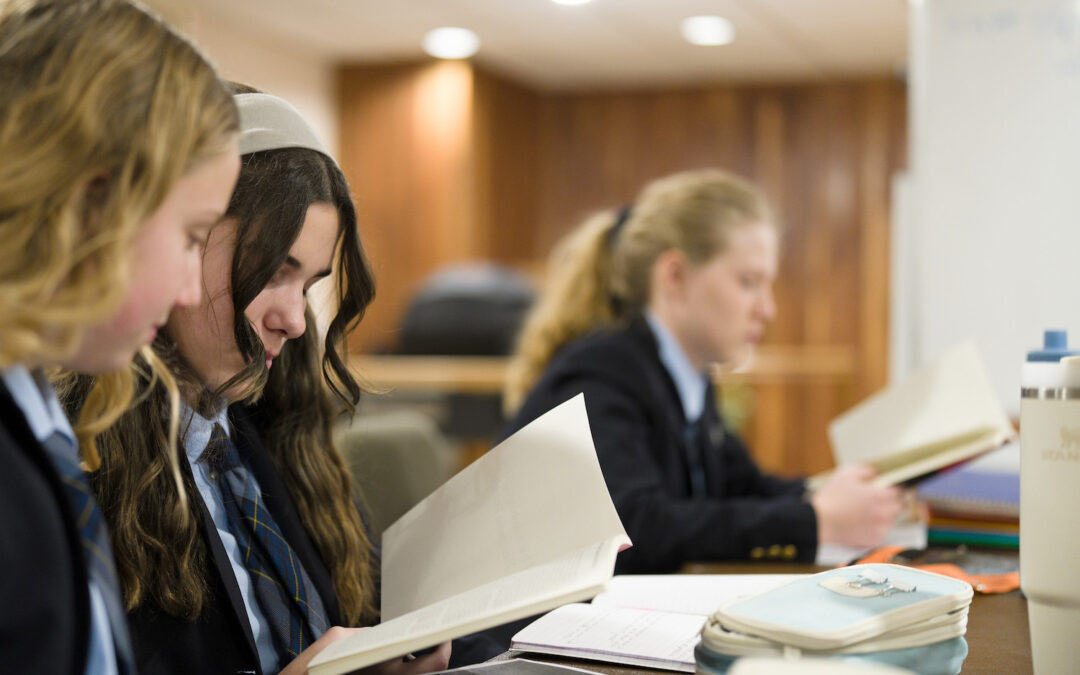As someone who is both Head of School and a parent of students at our school, I often get an added front row seat on the fruit of our labors as we commit to the time tested process of classical, Christian education. As with all parenting and career pathways, most of us at some point or another have asked ourselves, “Is this worth it? Are we seeing fruit? Do these things really matter?” The answer is yes. Yes, it’s worth it. Yes, there is fruit (even on the hard days), and yes, it absolutely matters.
On the drive to school this morning, my kids were talking about a school friend whose family recently had to put their dog down. My daughter asked in a very concerned voice, “Do they do that to people too?” Suddenly, I found myself in the throws of a very deep and weighty discussion at 6:45am before my coffee even kicked in, about ethics, the image of God, our eternality, our position as human beings, and a God who is sovereign over life, death, and everything in between. What struck me, however, was the way in which my 6th grade son joined the conversation.
He kept asking all of the “why” questions surrounding this issue. At first, I attributed it to his developmental age. But suddenly, as he continued talking, I realized I was engaging with the fruit of our labors as a classical Christian school. In classical Christian schools we start everything with: “God created us and everything else for one singular purpose- His glory.” All of a sudden, out of the backseat, I began to see the tiny sprout emerging from my son’s early logic school education. Here sat a very beginning logic student, on his own, wrestling with the logic of the topic at hand- All truth is God’s truth, and God created us and all things for his glory…So, what if this proposition is true? What follows? How should we live, given this purpose? I was completely awe-struck at his ability to detect the errors in an argument about whether or not we should be able to euthanize humans. He was even able to bring the conversation outside of the Christian worldview… “What would be the argument against euthanizing humans if a person does not believe in God or see Him as the ultimate authority. What would follow that? How then, should people live?”
As we drove on to school, I thought to myself that this was a perfect example of the difference between Bible classes and chapel versus Biblical integration that is the spine of classical, Christian education.
I had a meeting earlier this week with another Headmaster and we spent significant time discussing the difference between a traditional Christian school and a classical, Christian school. This obviously doesn’t pertain to every non-classical Christian school, but by and large, there are differences in how we approach our faith and its role in the education process.
source text below: ACCS
Traditional Christian Schools
Bible Classes & Chapel
Bible classes and chapel at traditional/conventional Christian schools provide a spiritual aspect to an otherwise progressive approach to education. Much of “Christianity” is set apart because the progressive model implicitly believes education has two parts: religious and secular. Academic accreditation, books, teacher training, and other systems shared with public schools ensure that they bypass other opportunities for Christian integration. This inadvertent practice results in a divided view, not a Christian worldview.
Emphasis: Bible teaching and spirituality are important, but separated from other subjects. Even Christian textbook authors mimic the progressive school approach and method. For example, they occasionally add a “spiritual” box at the end of an otherwise secular chapter.
Sources: The accreditation, teacher certification, and publishing industries interconnect throughout conventional K-12 education. The result–a latent separation of useful, vocational education and Christian truth.
Bible study takes place in a context of the moral and spiritual, while other subjects are seen as neutral, or disconnected. For example, In US government, students may talk about the Christianity of founding fathers, but they are unlikely to debate the Christian basis for Locke or Jefferson’s philosophical ideas.
Classical, Christian Schools
Biblical Integration
Classical Christian education (CCE) holds that the truth of Christ’s lordship is manifest in every area of study, academic and personal alike. Classicists maintain that God is the beginning and the end of everything we can know. Everything has unity in exactly one point—it was and is created and sustained by Jesus Christ. CCE integrates subjects under this premise.
Emphasis: We recognize that subjects are merely categories that educators impose for practical reasons. You may see devoted Bible time, or devotions within our schools. But, you’ll more frequently see biblical engagement with every subject and topic.
Sources: We use fewer “textbooks” that reflect the modern tendency to break knowledge into categories (sacred/secular). When we do use textbooks, the majority of our curricula is built by classical educators using classical methods and theory.
The Bible is the foremost tool for understanding any point of theology and philosophy. Since our entire core is philosophy based, the Bible formally becomes part of the entire curriculum.
Our teachers are typically trained outside of the conventional educational certification system.

For me personally, what we drove me to not just start a Christian school, but a classical Christian school was the deep disconnect I discovered in my faith and real life as I became an adult. Educated in public and traditional Christian education systems, I developed a solid knowledge of Scripture, but I absolutely lacked the experience to apply it in historical or existential ways. This greatly limited my Christian worldview application outside very black and white situations. When I began to find myself face to face with the challenges of modern ideologies, I reacted as I had learned, by compartmentalizing my faith in relation to other fields of knowledge. I wholly viewed the Bible and spirituality as a basis for my life and my beliefs, but most other things outside the obvious spiritual realm I saw as neutral, or disconnected.
Once I began to understand the schools of logic and rhetoric as an adult, I realized where I wanted my own children, and any school community I lead, to go… I wanted them to not only be taught the logic: What if this proposition is true- that God created us and everything else for one singular purpose, His glory? What follows? How should we live, given this purpose? But I also wanted them to go further with it. I didn’t want it just end with a spiritual box at the end of the lesson that says what does this application look like.
Instead, I saw the immense value of the classical Christian approach that goes further than the spiritual box at the end of a seemingly secular context…
As David Goodwin says,
“After given the logic, they are then taught to read and discuss great ideas from great thinkers, in great historical cultures, written in great texts. Students practice emulating the best arguments of these great texts, because there’s nothing like emulating a master to learn an art. And the art of logic and rhetoric teaches us that good arguments, after all, connect bedrock axioms with practical daily truth. Through this process, students learn to think well, to view our universe as one big system that fits together, and to understand this system as it reflects “God’s Glory alone.” This is practiced, not just taught. Over time and through this practice, the student’s loves, virtues, and passions are shaped within the order of God’s world.”
And this dear friends, is where the rubber meets the road…where the early logic student is seeing that every inch of thought, history, and natural creation is an extension of the work of Jesus Christ. This practice equips students to wisely navigate life’s ethical and spiritual challenges that they will inevitably face. Students learn to, as Paul wrote in Corinthians, “to take every thought captive to Christ,” meaning that they recognize the permanent and beautiful truth of redemption, in spite of what political propaganda, enticing opportunities, and cultural rhetoric they may encounter.


